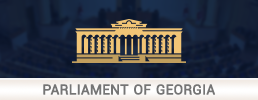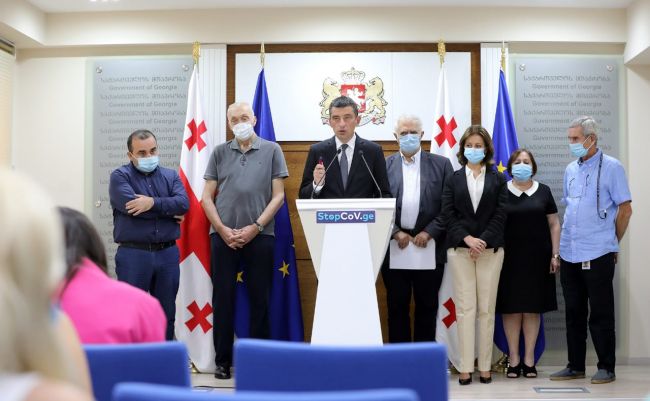2020-09-11
As of today, the number of infected people is unfortunately increasing globally. Unfortunately, the number of infected people is growing significantly in Georgia as well. Georgian Prime Minister Giorgi Gakharia made this statement together with Healthcare Minister Ekaterine Tikaradze at a briefing held at the Administration of the Government after the conclusion of the meeting with the heads of clinics.
According to the head of the government, there is no reason to panic with regard to the increase in the number of infected people in Georgia as epidemiologists, as well as the clinical group and the government, are in full control of the situation and are fully managing the risks associated with the spread of the pandemic.
"We understand that today, regardless of the steps we take, any step will have strong critics as well as supporters, though we are doing everything - and we must do everything - in the interests of our citizens and in accordance with the principle of prudence. This is precisely why this morning, we held a session of the Coordination Council and, most importantly, after this session, we had a meeting with the clinical group and we analyzed the processes that are taking place both globally and in Georgia. First of all, it is essential to say that today, there is no reason panic with regard to the increase in the number of infected people in Georgia, as epidemiologists, as well as the clinical group and the government, are in full control of the situation and are fully managing the risks associated with the spread of the pandemic. This does not mean, however, that we should not adopt additional measures or enforce already adopted measures more strictly. Today, the most important thing is discipline in the [enforcement] of the rules that we have all adopted together," the Prime Minister noted.
According to Giorgi Gakharia, no country taken separately - including Georgia - will be able to overcome the global pandemic alone. For this reason, the process of effective adaptation has always been important to us - the quick detection of infection, rapid treatment and, correspondingly, the swift return of our citizens to normal social and economic life.
"This principle has not gone anywhere and it remains in force. When we say that there is no reason to panic, we mean that we have used the last 5-6 months to completely reorganize all the systems that are fully involved in the management of the epidemic - in terms of management and logistics, as well as the management of the hospital system in epidemiological or clinical terms - and, as a consequence, they are in a completely different condition today. For example, when the state of emergency was declared in March, epidemiologists in Georgia were able to perform about 200 PCR tests per day. Today, an average of 8,000 PCR tests are performed in the country without any problems. This figure will increase to 10,000 in the near future and, if necessary, it can be increased further. All the mechanisms of prevention in the healthcare system - 112, primary healthcare, quarantine, detection, hospitalization - this system is already working like clockwork, there will be no hindrances here," the head of the government stated.
According to the head of the government, the Ministry of Healthcare has been instructed to have 3,000 beds in full readiness in the coming days, so that if the number of cases of infection were to increase, they could be treated quickly and efficiently.
According to Giorgi Gakharia, the responsibility of citizens is a much more important tool than a fine.
"We understand that a great deal of inconvenience has been created during the last six months. We have an absolutely prudent goal - the health of our citizens, the survival of the economy, and rapid recovery. We are no longer talking about the survival of the economy - we are talking about rapid recovery. Therefore, the responsibility of our citizens is a much more important tool than a fine. When we say that discipline and the enforcement of imposed restrictions is of extreme importance, this refers to basic things such as the mandatory use of face masks in enclosed spaces, as well as the recommended use of face masks in outdoor spaces - for example, wearing face masks when up to 200 people gather outdoors for various events. We must take all this into account, along with social distancing, personal hygiene, and so on," Giorgi Gakharia stated.
As the Prime Minister noted, Georgia's achievement in terms of the epidemiological, clinical management of the virus must be transferred to the economic dimension, and the economy must recover quickly.
"We said from the outset that unfortunately, it seems the global pandemic and the global virus will be with us for some time and we must get accustomed to coexisting with this challenge. We need all this in order to avoid damaging the economy. We do not intend to, and we are not prepared to impose strict economic restrictions. We - all of us, together with our citizens - are primarily interested in transferring our achievement in terms of the epidemiological, clinical management of the virus to the economic dimension, and ensuring the rapid recovery of the economy. To achieve this, we need the management of the virus to be effective. The use of face masks is not a difficult requirement; however, it seems we will need to impose certain restrictions as well and I think our citizens will absolutely treat these restrictions with understanding. I repeat: We understand that any steps we take today will have critics, as well as proponents. For us, however, the most important issues are the health of our citizens, life, and the economy," Giorgi Gakharia stated.
According to the decision made by the Interagency Coordination Council, teaching will resume in the classrooms and auditoriums of Tbilisi, Kutaisi, Rustavi, Gori, Zugdidi, and Poti from 1 October, similar to Batumi and Kobuleti; however, the education process will begin remotely from 15 September.
"This is necessary in order for us to correctly assess the current risks and to achieve this, we, together with the epidemiologists, need two weeks. After this, we will make additional decisions regarding the children. In Tbilisi, Kutaisi, Rustavi, Gori, Zugdidi, and Poti, the education process will begin remotely from 15 September, while learning in classrooms and auditoriums will resume from 1 October. We had already prepared a hybrid form of teaching as there are varying numbers of students in the various classes of different cities, and their number was distributed so that some could learn remotely, while others went to the classroom. This applies to everyone, including private schools. This also applies to various extracurricular courses that children attend, which are not held in outdoor spaces. Epidemiologists and specialists will create the relevant protocols for extracurricular courses that take place outdoors," the Prime Minister noted.
According to the head of the government, it is the responsibility of every citizen to monitor their own health, as well as to pay special attention to the elderly. Giorgi Gakharia urged citizens to contact 112 upon the detection of any initial symptoms, adding that the Ministry of Healthcare will provide them with the corresponding assistance.
"Everything we do is aimed at ensuring quick economic recovery. We must quickly restore every single job and do everything to restore the income that Georgian families had before the pandemic as soon as possible," Giorgi Gakharia stated.
The head of the government also answered the reporters' question concerning the possibility of changing the date of the elections, which are scheduled to take place on 31 October.
The Prime Minister pointed out that changing the date of the elections or making any changes to the election process are categorically not on the agenda. This is also true for all restrictions of the type that would have a direct impact on the economy.
Giorgi Gakharia also answered the reporters' question concerning the possibility that the increase in the number of infections was due to the fact that the government has relaxed its efforts.
The head of the government stated that the fact that today, the clinical group and the heads of clinics gathered instantly, as soon as it became necessary, shows that this is not true.
"On the contrary, we did everything correctly and in a manner that would prevent the economy from being completely shut down. We have a connection with our people and we are studying and their feelings. And even today, we find that under the conditions of such restrictions, the responsibility of citizens is a more significant tool than fines. There is no talk of someone relaxing their efforts here - neither the government, nor the citizens. What is under discussion here is us giving the citizens and the economy the opportunity to avoid the final destruction of the economy or the psychological state of our citizens," Giorgi Gakharia stated.
Statements at the joint briefing with the Prime Minister were also made by Minister of Internally Displaced Persons from the Occupied Territories, Labor, Health and Social Affairs of Georgia Ekaterine Tikaradze, General Director of the National Center for Disease Control and Public Health Amiran Gamkrelidze, and General Director of the Center for Infectious Diseases, AIDS and Clinical Immunology Tengiz Tsertsvadze.
Press Service of the Government Administration












